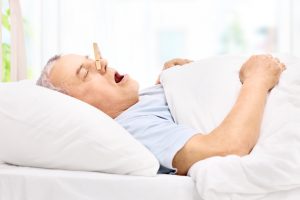 The holiday season is a great time of year to spend with family and friends, which often involves a bit of traveling. Traveling for the holidays can be a bit chaotic, so you want to ensure you are properly prepared. However, one area of preparation that is often overlooked involves sleep apnea. If you are among the 18 million Americans who suffer from obstructive sleep apnea, your holiday travel plans may come with certain challenges. As your sleep doctor for sleep testing, we want to ensure your travel plans go smoothly, while also protecting yourself from sleep apnea complications.
The holiday season is a great time of year to spend with family and friends, which often involves a bit of traveling. Traveling for the holidays can be a bit chaotic, so you want to ensure you are properly prepared. However, one area of preparation that is often overlooked involves sleep apnea. If you are among the 18 million Americans who suffer from obstructive sleep apnea, your holiday travel plans may come with certain challenges. As your sleep doctor for sleep testing, we want to ensure your travel plans go smoothly, while also protecting yourself from sleep apnea complications.
Travel Complications from Sleep Apnea
When living with sleep apnea, the sleep disorder can cause a wide range of symptoms, especially when left untreated. When you do not properly treat your sleep disorder, the frequent pauses in breathing and poor sleep quality causes complications throughout your day. In addition to waking with headaches, it is not uncommon to feel moody or have daytime fatigue. However, if your sleep apnea has been untreated for some time, sleep deprivation may have developed.
Sleep deprivation is quite serious as it significantly impacts your cognitive abilities and mood. This can pose a challenge if you plan to travel for the holidays. Research show that those with sleep apnea are over twice as likely to get into a motor vehicle accident. This is due to excessive daytime sleepiness. However, those who use the proper treatment, the risk for accidents decreases by as much as 70 percent.
To stay safe while traveling for the holidays, you need to ensure you are treating your sleep apnea correctly.
Preventing Travel Complications with Sleep Apnea
If you suspect you have sleep apnea due to chronic snoring or other symptoms, you need to undergo a sleep study to be diagnosed. After analyzing the data from your study, a treatment plan can be created. Treatment for obstructive sleep apnea can include the use of a CPAP machine or an oral appliance. While traveling, you will need to take your sleep apnea treatment with you.
Even with the right treatment, you may still have some lingering symptoms of the sleep disorder. If you will be driving, be sure to try to get as much sleep as possible. Take frequent breaks while driving and bring someone with you to share the driving responsibilities. In addition, if you begin to feel tired, pull over immediately to get some rest.
If you begin to notice you are blinking excessively or your eyes are feeling heavy, those are indications you are too tired to drive. In addition, if your mind is wandering, you are yawning, having trouble keeping your head up or feeling restless, you need to take a break.
Stay Safe for the Holidays
Do not let the complications of untreated sleep apnea ruin your holiday travel plans. Protect your health and stay safe with sleep apnea treatment. If you need a sleep study or sleep apnea treatment, contact our office to schedule an appointment.
